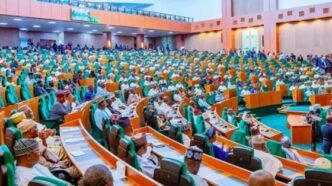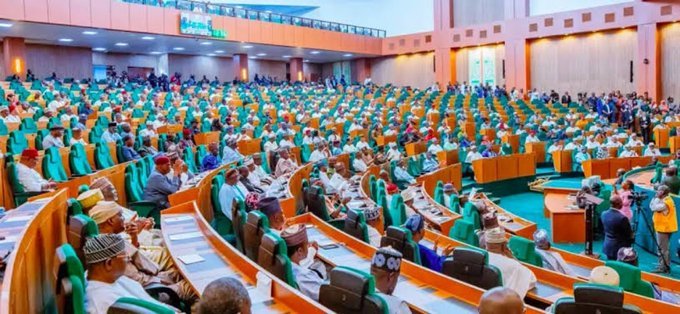Abuja — November 2, 2025
In a move aimed at promoting rural development, alleviating poverty, and improving the living standards of millions of Nigerians, the House of Representatives has proposed a ₦3,500 daily wage for unskilled labourers across the country. The proposal is contained in a new bill currently under consideration, designed to institutionalize a fair wage system and enhance livelihoods in rural and agrarian communities.
The initiative, titled the “Sustainable Rural Employment and Livelihood Enhancement Bill,” seeks to create a legal framework that guarantees fair compensation for unskilled workers while supporting national efforts to bridge income inequality and stimulate local economies.
Objectives of the Bill
According to lawmakers sponsoring the bill, the core objectives are threefold:
- Promote Sustainable Rural Development: The legislation aims to boost rural economies by ensuring fair remuneration for workers engaged in community projects, agricultural work, and infrastructure development.
- Reduce Poverty Levels: By guaranteeing a ₦3,500 daily wage, the bill seeks to provide a reliable income source for millions of Nigerians living below the poverty line.
- Enhance Livelihoods and Food Security: The House believes that improving the welfare of rural labourers will directly impact agricultural productivity, food distribution, and rural sustainability.
Presenting the bill during plenary, the sponsor, Hon. Ibrahim Danladi, noted that the majority of Nigeria’s unskilled labour force lives in rural areas, where economic opportunities remain limited. “We cannot continue to ignore the fact that unskilled workers are the backbone of our rural economies. Their labour sustains agriculture, infrastructure, and small-scale industries, yet they remain the most underpaid and undervalued segment of society,” Danladi said.
Why ₦3,500 Daily Wage?
The proposed ₦3,500 daily rate is based on a national cost-of-living estimate, taking into account rising inflation, transport costs, and basic food prices. Currently, Nigeria’s national minimum wage stands at ₦30,000 monthly, which translates to approximately ₦1,000 per day—an amount widely criticized as inadequate given the country’s inflationary pressures and depreciating naira.
If approved, the ₦3,500 daily rate would amount to roughly ₦105,000 per month for unskilled workers, representing a 250% increase over the current national minimum wage.
Impact on Rural Development and Agriculture
Nigeria’s rural population accounts for over 50% of the country’s 220 million people, with agriculture serving as the primary source of livelihood. However, many rural labourers earn less than ₦1,500 daily, often working without contracts, insurance, or access to social benefits.
The proposed wage reform, according to the bill’s proponents, will not only raise living standards but also reduce migration from rural areas to overcrowded cities. Lawmakers believe this could have a ripple effect on national development by stabilizing rural economies and enhancing food production capacity.
Hon. Danladi added that fair compensation will “motivate local workers, reduce exploitation by contractors, and restore dignity to manual labour in Nigeria.”
Implementation Strategy
The bill outlines a multi-tiered implementation strategy involving federal, state, and local governments, alongside community-based organizations and private sector partners.
Key provisions include:
- Wage Enforcement Units: Each local government will establish a unit responsible for monitoring compliance with the ₦3,500 wage benchmark.
- Rural Development Trust Fund: A special fund will be created to support wage payments for government-initiated rural projects, particularly in agriculture, construction, and public works.
- Private Sector Participation: Companies benefiting from government contracts in rural areas must comply with the wage rule as a precondition for contract approval.
- Monitoring and Evaluation: The National Bureau of Statistics (NBS) will oversee data collection on rural wage compliance and economic impact assessments.
Economic Implications
While the proposed wage increase has been widely welcomed by labour advocates, economists are divided on its potential impact. Some experts argue that the ₦3,500 daily wage could inject significant purchasing power into rural communities, driving local demand and stimulating small businesses.
However, others warn that without corresponding productivity improvements and subsidy mechanisms, the policy could raise the cost of production for small-scale employers, especially in agriculture and construction.
Dr. Chika Eze, a development economist at the University of Nigeria, Nsukka, said, “The idea is progressive and people-oriented, but the government must ensure it doesn’t become another unfunded mandate. The key lies in balancing wage growth with productivity and inflation control.”
Reactions from Stakeholders
The proposal has already generated mixed reactions across labour unions, employers, and civil society groups.
The Nigeria Labour Congress (NLC) commended the House for “finally recognizing the dignity of unskilled labour.” In a statement signed by its President, Joe Ajaero, the NLC described the ₦3,500 daily wage as “a step toward equity and fairness,” but urged lawmakers to ensure robust enforcement mechanisms.
Conversely, the Manufacturers Association of Nigeria (MAN) expressed concerns about the impact of the proposed wage on production costs. “Many small and medium enterprises are already struggling with energy costs, taxes, and inflation. An abrupt wage hike without corresponding government incentives could push some of them out of business,” said MAN spokesperson, Segun Ajayi-Kadir.
Government’s Position
The Federal Ministry of Labour and Employment has yet to issue an official statement, but sources within the ministry indicated that consultations are ongoing to align the proposed wage policy with the ongoing minimum wage review process.
A senior ministry official, speaking anonymously, said: “The House’s initiative is commendable, but implementation must be harmonized with national wage structures and fiscal realities. We don’t want a situation where state governments or private employers default due to financial constraints.”
Comparative Context
Nigeria’s proposed ₦3,500 daily wage would bring the country closer to the standards in some African nations with similar economic profiles. For instance, in Ghana, the daily minimum wage stands at the equivalent of about ₦2,800, while in Kenya, unskilled workers earn roughly ₦3,200 per day in urban areas.
The bill’s supporters argue that Nigeria’s vast resource base and population size justify a higher benchmark, especially as inflation and currency depreciation continue to erode real incomes.
Next Legislative Steps
The bill has been referred to the House Committee on Labour, Employment and Productivity for further scrutiny. The committee is expected to hold public hearings to gather input from stakeholders, including labour unions, employers, rural associations, and economic experts.
If passed by both chambers of the National Assembly and assented to by President Bola Tinubu, the ₦3,500 daily wage will become legally enforceable nationwide, marking one of the most ambitious wage reforms in Nigeria’s history.
Conclusion
The House of Representatives’ proposal to set a ₦3,500 daily wage for unskilled labourers has reignited national debate about fair pay, economic justice, and rural development. While the move could transform the lives of millions of low-income Nigerians, its success will depend on effective implementation, stakeholder collaboration, and fiscal discipline.
For now, the bill symbolizes a renewed commitment by lawmakers to prioritize the welfare of the working poor—those whose daily sweat sustains the nation’s fields, roads, and construction sites. Whether this promise translates into lasting progress will depend on political will and practical action in the months ahead.














